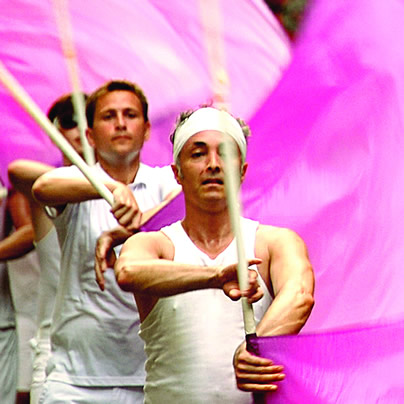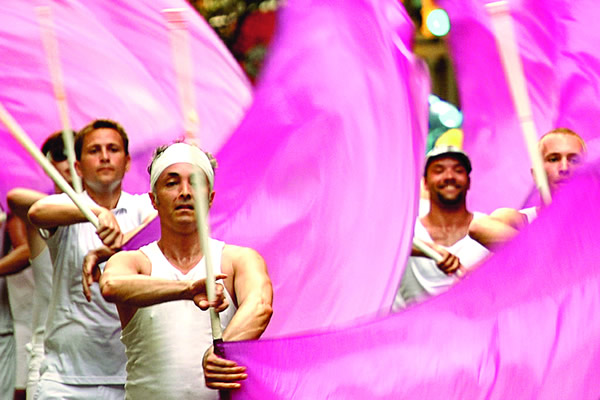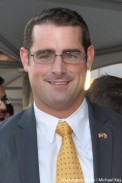Arts & Entertainment
Progress in Pennsylvania
A mini trend of change as openly gay officials emerge

When Philadelphia attorney Brian Sims set his sights on a seat in Pennsylvania’s storied state House last September, the odds were stacked against him: Not only would he be a political newcomer, but he also was running as an openly gay man in the same state that once elected virulently homophobic former U.S. Sen. Rick Santorum.
Seven months later, however, he won his primary race to represent the 182nd District in the state House of Representatives, part of a mini trend of recent gay-supportive political changes that have some wondering if a progressive wave isn’t starting to emerge in the Keystone State.
Supporters of the idea point to Sims, who is running unopposed in the November election, as well as to 24-year-old gay Harrisburg Treasurer John Campbell, who is helping the state’s capital city cope with its much publicized bankruptcy. Meanwhile, a state LGBT Equality Caucus is active, and members of the House State Government Committee recently killed efforts to amend the constitution to ban same-sex marriage.
Campbell, a college student who hopes to use tax reform to free Harrisburg from a $300 million debt pileup, believes Sims’ election could signal more positive change to come.
“All states that have passed a marriage equality bill have previously elected an openly gay legislator,” Campbell said, adding that having an out gay man in the state House would go far to personalize the issue of LGBT rights. “It really helps our argument that we are people too.”
Sims said LGBT supporters are making their presence known in the state. He pointed to widespread support among Pennsylvanians for a measure to add LGBT-friendly language to the state human relations act.
The legislation, House Bill 300, has stalled several times in committee.
“I’ve spent years traveling the state talking about LGBT rights and one of the things I like to tell people is the state is not as conservative as people think it is,” said Sims, adding that the state’s failure to pass LGBT-inclusive hate crimes and anti-bullying measures isn’t necessarily reflective of constituent sentiment.
Sims, former board president of Equality Pennsylvania, is poised to become the state’s first openly gay legislator. He has a background of working with attorneys, legislators and community organizations on issues ranging from gender and pay inequity to environmental regulation. And though he didn’t make LGBT issues a campaign lynchpin, he plans to continue including LGBT matters alongside corporate income tax reform and other key issues as he moves forward, he said.
He said such matters increasingly reflect the interests and spirit of the state.
“The state is progressing — we are growing stronger by the minute,” he said. “I don’t necessarily know that our current laws and political structure really do reflect how forward-thinking the people in the state are.”
Opinions of Pennsylvania’s progress are as diverse as its record supporting gay and lesbian residents. The state has historically been a maverick on some fronts, among them the establishment of a state Council for Sexual Minorities in the mid ’70s, and the recent passage of the state’s 28th local LGBT-inclusive non-discrimination ordinance.
And in Philadelphia, home to what’s considered the nation’s oldest operating gay bookstore in Giovanni’s Room, a vibrant LGBT community thrives, according to Mark Segal, who has spent 37 years chronicling the community’s ups and downs as founder of Philadelphia Gay News.
“Society is moving at a brisk pace toward equality and I think this is happening everywhere. But you also have to look at history. Philadelphia is, in many ways, the birthplace of the LGBT movement,” he said, citing the city’s 47-year history of gay Fourth of July marches as an example.
But weak spots remain. For one, those local LGBT-inclusive non-discrimination ordinances are the result of lawmakers’ failure to pass state-level legislation, and are essentially, local attempts to patch up gaps in state law.
And even as President Obama announced his support for same-sex marriage, Pennsylvania Sen. Bob Casey (D) has remained conspicuously quiet on the issue.
“[Pennsylvanians’] reputation in general is one of being pretty safely in the middle, and what that means is sometimes they’re progressive, and sometimes they’re not,” said Ted Martin, executive director of Equality Pennsylvania. “It’s a place that doesn’t want to rush out too far nor does it like to be in the end.”
The head of the state’s main LGBT advocacy group said he believes Pennsylvania is growing more progressive, just very slowly.
He pointed to recent polls showing up to 51 percent of state residents support same-sex marriage and said lawmakers he encounters no longer insist they don’t have any gays in their district.
“Are we turning a corner, are we taking some steps forward? I like to think so,” he said. “We’re certainly starting to have a conversation we never had and that’s a good thing.”
That conversation comes at a sensitive moment in regional LGBT politics. Surrounded by states passing LGBT-friendly measures, Pennsylvania has increasingly become an ideological island, a fact that could have a damaging economic impact, some say.
“Many places that already permit same-sex marriage — New York, Maryland, D.C. and others — are geographically close to Pennsylvania,” Rep. Babette Josephs told Philadelphia magazine last week. “We will be losing valuable citizens to these other states because of our backward ways; the image of Pennsylvania will continue to be tarnished.”
But turning Pennsylvania into a more progressive state presents a significant challenge. For one, the state’s political landscape remains blue at the edges, anchored by liberal Philadelphia and Pittsburgh, with a rural, conservative center.
Moreover, that center enables a powerful Republican Party that keeps the General Assembly “in a 1950s bubble,” Segal said.
But Campbell believes that makes the state better poised than most to be a national example of change.
“If a battleground state is trending toward being more open and accepting, that should lead the way for other states to do the same,” Campbell said. “It’s important to show that even Pennsylvania can do it.”
Television
ICYMI: ‘Overcompensating’ a surprisingly sweet queer treat
A sweet, savvy show about breaking free to embrace your true self

Pride month 2025 is now behind us, and while it’s safe to say that this year’s celebrations had a darker edge than usual, it’s also true that they came with a particularly rich bounty of new queer movies and shows to entertain us – so many, in fact, that even if we are facing a lull until the fall another harvest of fresh content, there are still plenty of titles – which, for whatever reason, were off your radar – for you to catch up on in the meantime.
One of the most notable of these – the bingeworthy series “Overcompensating” (now streaming on Amazon Prime) – will most definitely have been ON the radar for the plentiful fans of creator and star Benito Skinner, the actor/comedian who rose to viral fame through his content on platforms like Instagram, YouTube, and TikTok. For anyone else, it might have easily slipped through the cracks.
Created and written by Skinner as a loosely autobiographical “college comedy,” it aims for the kind of raucous, explicitly sexed-up tone one expects from the genre as it centers on Benny (Skinner), newly arrived as a freshman at prestigious Yates University. A former football jock and “golden boy” at his midwestern high school, he’s the picture of idealized youthful masculinity; he’s also deep in the closet, struggling to keep his sexuality hidden and maintain his macho front under the intense scrutiny of the college’s social scene – and under the resentful eye of his older sister Grace (Mary Beth Barone), who has already secured her own place at the top of the pecking order.
In the first episode, Benny’s difficulties are eased when he meets Carmen (Wally Baram), another freshman trying to navigate the politics of college life; a gamer from a home marred by tragedy, she’s an outsider who feels like she’s putting on an act, too, and they click – giving him the convenient “cover” of female companionship while providing them both with much-needed support and encouragement. He’s also befriended by a handsome film major from England (Rish Shah), who has already caught his eye, stirring other kinds of feelings and possibly even reciprocating them. Meanwhile, he’s being courted by the school’s “exclusive secret society” – headed by his sister’s aggressively “alpha” boyfriend Pete (Adam DiMarco) – and trying to stay interested in his studies, despite a growing realization that a career in business doesn’t actually appeal to him all that much.
That’s a lot to juggle for anybody, even an overachiever like Benny – whose “lucky” life so far has largely been the result of playing a role he is finding harder and harder to maintain. As the series goes on through its eight-episode arc, it becomes clear that he’s not the only one who is “keeping up appearances,” and he, along with the other confused and damaged young people in his orbit, begins the painful (but often hilarious) process of evolution that is required in order to become truly oneself.
Directed toward appealing to a younger demographic, “Overcompensating” is the kind of show that requires a few episodes worth of invested time to make an impression that feels like substance. Full of the bawdy farcical antics that go hand in hand with stories about hormonally charged college kids, it’s not above leaning into the formulas and tropes that have always driven these kinds of comedies. At first, while its broadly comedic strokes and frequently explicit sexual hijinks might elicit plenty of chuckles, the show might easily feel tiresome for more mature audiences; there’s a nostalgic fun to it, made even more appealing, somehow, by the “political incorrectness” of its frequently sexist and homophobic humor, but for a while things may feel like an unnecessary attempt to reinvent “Animal House” for the Gen Z crowd.
By the time the season reaches its halfway point, however, things have started to get real. The antics of these horny almost-adults take on a more pointed absurdity, informed by the increasingly tangled web of defensive deceit they weave among themselves – and, as things draw toward a cliffhanger climax, the consequences of maintaining it – until it achieves a sense of empathy toward them all. There’s a wisdom that smacks of lived authenticity underlying the whole affair, transforming it from the “sexploitative” teen comedy of its surface into something deeper. To be sure, things stay expectedly wacky, and the soap-operatic melodrama of its twists and reversals continue to maintain the show’s “mature YA” appeal; but beneath those trappings, by the end of the season a truer identity has begun to emerge, just as its characters have begun to find their own levels of self-actualization for themselves.
As creator, primary writer, and star, it’s obviously Skinner who deserves much of the credit. While it might be tempting, early on, to dismiss the show as an “ego project,” the internet-spawned sensation proves his talents quickly enough to get past such judgy suspicions, delivering a pitch-perfect blend of sauciness and sensitivity that extends its appeal toward both ends of the taste spectrum; just as crucially, he brings the same aforementioned “lived authenticity” to his winning performance – after all, he’s essentially playing himself in a fictionalized version of his own life – while also making sure that equal time (and compassion) is afforded all the other characters around him, each of whom are pushing at the boundaries of their own respective “closets,” too. It’s unavoidable to notice that – like most of his co-stars – he’s plainly a decade too old to be playing a college student; but by the time we reach that crucial halfway turning point, we’ve become too engaged by him to care.
The show is full of excellent performances, in fact. Relative newcomers Baram and Barone offer layers of complex nuance, while the more familiar DiMarco (“White Lotus”) is close to heartbreaking as the toxic BMOC clinging to the illusion of power as his life begins unraveling around him. Other standouts include the mononymic actress Holmes as Carmen’s “wild child” roommate, solidly likable turns as Benny’s parents from mature veterans Connie Britten and Kyle MacLachlan (whose presence, along with stylish elements in several key scenes, hints at an homage-ish nod to the late David Lynch), and podcaster Owen Thiele as an openly gay fellow student who has Benny “clocked” from the moment they meet. Finally, Lukas Gage makes a deep impression as a former high school teammate at the heart of Benny’s most haunting memory.
There’s no official word yet on whether “Overcompensating” will be renewed for a second season, despite the multiple loose ends left dangling at the end of its first; it has proven to be popular, and Skinner’s large fanbase makes it likely that the story will continue. Even if it doesn’t, the place of uncertainty in which it has left its characters rings true enough to serve as a satisfying endpoint.
As for us, we hope that won’t happen. For all its sophomoric humor, generic plot twists, and purposefully gratuitous sexual titillation, it’s one of the sweetest, kindest, and most savvy shows we’ve seen about breaking free from conformity to embrace your true self – and that’s a message that applies whether you’re queer, straight, or anywhere in between.
Photos
PHOTOS: Independence Day Weekend in Rehoboth
Wicked Green Pool Party, fireworks among festivities

Vacationers and residents alike enjoyed Independence Day Weekend activities in Rehoboth Beach, Del. The Wicked Green Pool Party drew hundreds to the CAMP Rehoboth fundraiser on Saturday. That evening, revelers went to the rooftops to watch the fireworks display.
(Washington Blade photos by Daniel Truitt)













Music & Concerts
Red, White, and Beyoncé: Queen Bey takes Cowboy Carter to D.C. for the Fourth of July
The legendary music icon performed on July 4 and 7 to a nearly sold-out Northwest Stadium.

Just in time for Independence Day, Beyoncé lit up Landover’s Commanders Field (formerly FedEx Field) with fireworks and fiery patriotism, bringing her deeply moving and genre-defying “Cowboy Carter” tour to the Washington, D.C. area.
The tour, which takes the global icon across nine cities in support of her chart-topping and Grammy-winning country album “Cowboy Carter,” landed in Prince George’s County, Maryland, over the Fourth of July weekend. From the moment Beyoncé stepped on stage, it was clear this was more than just a concert — it was a reclamation.
Drawing from classic Americana, sharp political commentary, and a reimagined vision of country music, the show served as a powerful reminder of how Black Americans — especially Black women — have long been overlooked in spaces they helped create. “Cowboy Carter” released in March 2024, is the second act in Beyoncé’s genre-traversing trilogy. With it, she became the first Black woman to win a Grammy for Best Country Album and also took home the coveted Album of the Year.
The record examines the Black American experience through the lens of country music, grappling with the tension between the mythology of the American Dream and the lived realities of those historically excluded from it. That theme comes alive in the show’s opening number, “American Requiem,” where Beyoncé sings:
“Said I wouldn’t saddle up, but
If that ain’t country, tell me, what is?
Plant my bare feet on solid ground for years
They don’t, don’t know how hard I had to fight for this
When I sing my song…”
Throughout the performance, Beyoncé incorporated arresting visuals: Black cowboys on horseback, vintage American iconography, and Fox News clips criticizing her genre shift — all woven together with voiceovers from country legends like Dolly Parton and Willie Nelson. The result was a multimedia masterclass in storytelling and subversion.
The “Cowboy Carter” tour has been a social media sensation for weeks, with fans scrambling for tickets, curating elaborate “cowboy couture” outfits, and tailgating under the summer sun. At Commanders Field, thousands waited in long lines for exclusive merch and even longer ones to enter the stadium — a pilgrimage that, for many, felt more like attending church than a concert.
One group out in full force for the concert was Black queer men — some rocking “denim on denim on denim on denim,” while others opted for more polished Cowboy Couture looks. The celebration of Black identity within Americana was ever-present, making the concert feel like the world’s biggest gay country-western club.
A standout moment of the night was the appearance of Beyoncé’s 13-year-old daughter, Blue Ivy Carter. Commanding the stage with poise and power, she matched the intensity and choreography of her mother and the professional dancers — a remarkable feat for someone her age and a clear sign that the Carter legacy continues to shine.
It’s been nearly two decades since Beyoncé and Destiny’s Child parted ways, and since then, she’s more than lived up to her title as the voice of a generation. With “Cowboy Carter,” she’s not just making music — she’s rewriting history and reclaiming the space Black artists have always deserved in the country canon.
-

 Virginia2 days ago
Virginia2 days agoDefying trends, new LGBTQ center opens in rural Winchester, Va.
-

 South Africa5 days ago
South Africa5 days agoLesbian feminist becomes South African MP
-

 Travel4 days ago
Travel4 days agoManchester is vibrant tapestry of culture, history, and Pride
-

 Opinions3 days ago
Opinions3 days agoUSAID’s demise: America’s global betrayal of trust with LGBTQ people















